YAMAHA SHOCK - I DON'T THINK SO
The withdrawal of the Yamaha team from the World Superbike Championship was said to have sent shockwaves through the team, in the paddock and around the world.
Well, it would undoubtedly come as a shock to the team because they operate in a little bubble which insulates them from events outside racing. But to those observers who have some knowledge of the state of the motorcycle industry, particularly as related to Japan, it should have come as no surprise.
Sales of bikes, particularly in Europe and the US, have suffered badly as a second recession looms. Japan has has a particularly difficult time because of the earthquakes , the tsunami and the resulting nuclear crisis. Yamaha, which is a relatively small manufacturer compared, say, to Honda has lost money in recent years.
Racing may help in the development of road bikes but most of all it is a marketing expense. And what is the first category to be cut when profits go down - marketing. Two full-blown teams in MotoGP and WSB employing some very expensive personnel was a continuing expense the organisation could not afford. At least one had to go.
Why WSB? Even though MotoGP is several times more expensive, the manufacturers are more committed to it and the audiences are several times bigger. It also has more potential in growing markets such as China, India and South America. Finally, it has Valentino Rossi - for the time being!
The real concern is that during this turndown other manufacturers may follow now Yamaha has taken the plunge. Why do Suzuki continue? Ducati are a very small manufacturer and were it not for £20m+ of sponsorship from Marlboro, Generali and Shell they would not be in the game. Yamaha, you may recall, could not attract a main sponsor for either team this season.
And sponsorship, or lack of it, is part of the problem. It is not just manufacturers cutting marketing budgets. Other products such as electronics, fuel etc. which appeal to the audience attracting by bike racing have marketing budgets too and you can bet that they are being examined in detail by the bean-counters.
But as was pointed out elsewhere by the Editor, we have been through this before. And the Althea Ducati team are a great example. The Bologna bike maker withdraw their works team, turn up with a "privat" team which is, presumably, much cheaper and blow everybody else to the weeds!
How much does racing need manufacturers; how much do manufacturers need racing? Taking the latter point first, there is no doubt that participation, and success, in racing does move metal out of the showrooms. The question is, how much do you need (can you afford) to spend? And in the economic boom it was almost certainly too much which makes the inevitable downturn all the more difficult to handle.
Does racing need "works" teams? Not necessarily as Althea Ducati and many others before prove but it does need competitors of that standard. It's got to deliver exciting, competitive racing and it has got to create heroes.
Where does the buck stop? The owners and promoters of MotoGP, World Superbikes and British Superbikes. You must step up to the plate.
THE GREAT DILEMMA
The dilemma, indeed conflict, which racing organisers face is one of reducing costs while improving the entertainment on offer in order to satisfy spectators, broadcasters and sponsors. Nobody wants to pay more for less.
It seems to have taken a long time for some, if not all, of them to have woken up to what is now a fact that the bloated costs of the circus they own could not go on. In the order of the accused It has to be said that MotoGP stands first in line. The introduction of Moto 2 and the proposed changes to the main event are two years too late. Their get-out-of-jail card, Rossi joining Ducati, is little short of a disaster.
Part of their problem is that they are too heavily influenced by the Japanese factories, run by engineers for whom a prototype series was the Holy Grail. The fact that nobody other than their own factories could afford to compete was neither here no there.
It could also be said that World Superbikes is too heavily in hock to everything Italian and that Ducati and Aprillia have been allowed to get away with murder. But at least they have been innovative in terms of introducing tyre controls etc., although the money seems to go to the series rather than the teams.
However, both series have failed to control costs sufficiently in order to level the playing field, hence grids of 20 bikes or less. Expensive electronics proliferate with no benefit to the spectator, indeed the spectacle has been considerably lessened.
So, does anyone emerge with any credit to this chapter of decline. Step forward British Superbikes led by Jonathan Palmer and Stuart Higgs. Although regulated by a faceless body under the acronym MCRCB it is controlled by the above duo and although their dictats are not always to the liking of everybody, one or two team owners for a start, they just happen to run the most successful and (probably) commercially sound series in the world.
They seem seem to have walked the tightrope between costs and entertainment rather well. But there is more to come because next year is not going to be easier as everyone from the fan to the sponsor will probably have less money to spend. Their job is to keep the teams and the riders in business while attracting the fans through the gate.
On the basis that innovation is wonderful but plagiarism is faster, other championships might do worse than copy their qualifying races formula, one bike per team etc. And now their moves to simplify the electronics by having a standard system which also outlaws traction control, launch control and other rider deskilling gimmickry. And while the die-hards complain at some of these moves, keeping spectators and viewers coming back for more is far more important than "fairness."
Keep it up.
PS. Just to make it more interesting, how about in two-leg events reversing the grid for the second leg, ie the first eight finishers in race one are places in reverse order on the grid for race two. Not fair .... but interesting!
GARY NIXON
The death of Gary Nixon closes the book on one of the legends of racing. Few racers are champions at both dirt track racing and the road. Nixon was just that and along with the likes of Cal Rayborn and Kenny Roberts was known and loved the world over.
It was the Transatlantic races in the early seventies which made him known to British fans. We thought the Yanks wouldn't be much good in the rain. We were wrong.
He was one of the original hell raisers and a great friend of Barry Sheene. His book Racer, co-written by a journalist called Joe Scalzo, was one of the best descriptions of a dirt riders life in the States during that period; driving thousands of miles from one State Fair to the next; sleeping in the pick-up trucks; frying eggs in the hub caps.
He was a free spirit for whom life truly was for living.


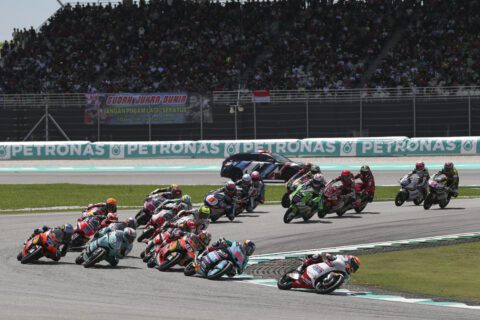
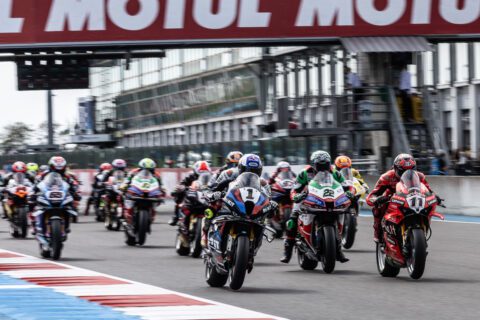
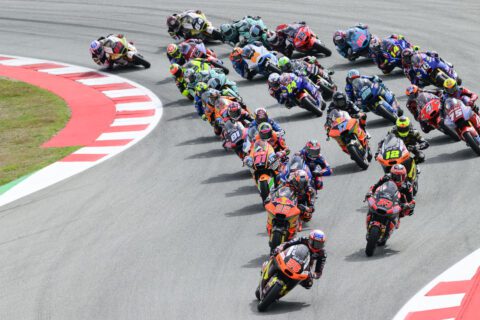
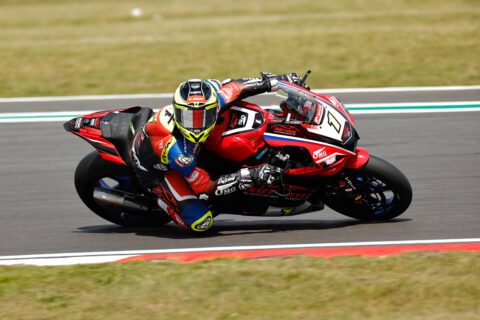
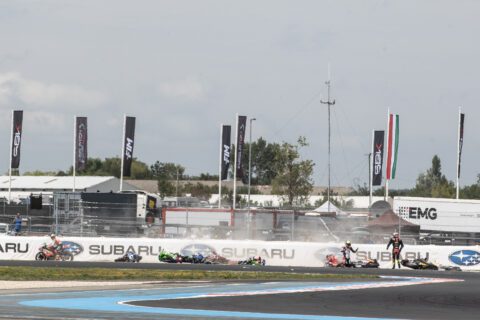
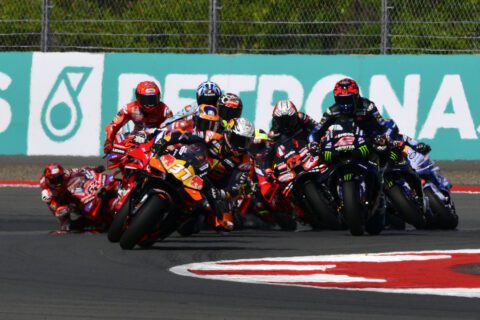
![Shane Byrne, Monstermob Ducati, 2003 WorldSBK, action [Gold & Goose]](https://bikesportnews.com/wp-content/uploads/2025/07/Shane-Byrne-Monstermob-Ducati-2003-WorldSBK-action-Gold-Goose-480x272.jpg)

